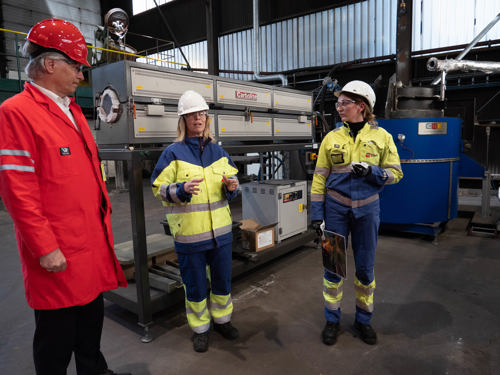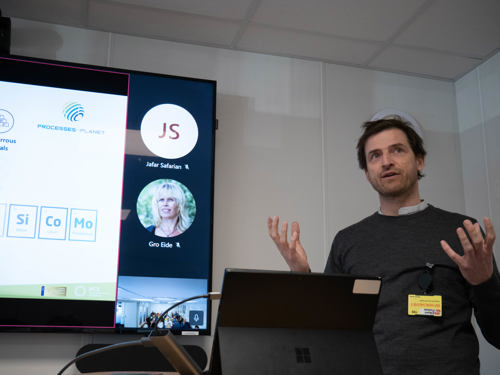Recycling project for critical raw materials
The EU project SisAl aims to contribute to Europe both becoming more self-sufficient in the critical raw materials needed in the process industry, and achieving its climate goals by cutting emissions from current production methods - through industrial business symbioses.
There are few significant examples where industry makes use of another industry's waste or side streams. Most of the production is still linear, and not circular. That is why the SisAl project is so important - where silicon and aluminum companies are connected. On Tuesday, there was a workshop in the project group, where parliamentary representative Ola Elvestuen (V) and Daniel Cios from the European Commission also participated.
- In addition to removing all direct emissions of CO2 and NOx to make silicon and save energy, the process will utilize slag (dross) and scrap from the aluminum industry, says materials researcher at NTNU, Maria Wallin about the SisAl method that NTNU has developed.
Pilots at Elkem Technology
Together with Professor Gabriella Tranell, Wallin leads the EU project SisAl, which also includes 22 partners in research and industry in Europe and South Africa. The tests for the method have been carried out at Elkem Technologies' test lab and pilot factory, where several innovative projects have been tested.
Read about: From Waste to Value project
- Together we do a good job on the technical side. We send the frameworks back to the authorities, says Gro Eide, head of research at Elkem Technology.
Strategic and critical raw materials
Behind the project, in addition to working towards lower emissions, there is also a geopolitical aspect when it comes to raw materials. Europe must to a greater extent be independent of the resources of larger countries. Especially in the world situation we now find ourselves in.
Daniel Cios of the European Commission divides the raw materials into strategic and critical. Where the former are raw material found in certain land areas, and critical where there may be a shortage of this raw material. A board has therefore been established in the EU for critical raw materials, where Cios participates as an observer. This board collaborated with Norway to establish matchmaking between companies that can benefit from each other in a circular economic way.
New forms of cooperation
Maintaining a close connection with the EU is therefore important for the Norwegian process industry.
- The most important thing for us is to be as close as possible to these constellations and with the European Commission when the rules are drawn up. It will be a problem for Norwegian industry if they "store" too much. The industry has an important role in maintaining our position, says Ola Elvestuen (V), but clarifies that despite the pace of development, we must take care of nature.
- Russia and China will cooperate more, so cooperating with Europe makes this cooperation stronger. We are in a global competition where new forms of cooperation are established, adds Elvebakken.
Move projects to the next phase
- It is important to find out how we can lift important projects into the next phase. Because 2030 is closer than we think, and we must not be behind, says Christophe Pinck, head of international relations in the Eyde Cluster.
Stine Skagestad, head of circular restructuring in the Eyde Cluster, refers to the side stream mapping, including the CIRCI project, which is relevant in this work, where new business models are to be established.


HVA SKJER
Se hele kalenderen >-
ARENDALSUKA: Prosessindustrien: Norges bidrag til Europas sikkerhet!
Vitensenteret (VitenUstillingen) -
ARENDALSUKA: Get-together i regi av NEW Node Eyde Women
Kystveien 2. 4841 Arendal, terrassen i 4.etg (Eyde-klyngens lokaler) -
ARENDALSUKA - Global Outlook 2025
Arendal kulturhus, Store Torungen -
ARENDALSUKA: Batterier – Beredskap og bærekraft i en urolig tid
Vitensenteret (VitenUstillingen) -
Arendalsuka: Industrimingling med Prosess21
VitenUtsillingen, Kystveien 2

